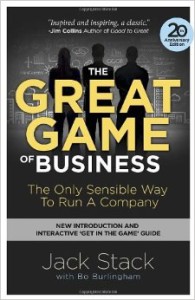I was recently talking to an MBA student about the power of participation. Often, leaders think that they have to have all the answers. This is not only silly, but it can be very costly. Leaders who are humble enough to know that they need their people can turn crises into opportunities. One of the best examples comes from Jack Stack’s The Great Game of Business. Stack Wrote:
A few years ago, we had a problem with a competitor who tried to come in and take away our fuel-injection pump business. It all began when a new buyer was appointed at one of our major customers. Seeing an opportunity, our competitor went to him and offered to supply pumps at a price below ours. It was a smart move. The new buyer wanted to make a good impression on his company, and reducing costs was a good way to do it. So the Buyer came to me and said, “Look. I don’t have any choice here. Unless you reduce your price by 6 percent, I’m going to give the business to the other guy. I’ll give you three months to get the price down to his level.”
Now a 6 percent price reduction was basically the difference between making money and losing money on the product. We couldn’t imagine how our competitor was going to make money at that price. As it happened, we owned a share of his stock. We checked out his financials, and we saw that he had an unbelievable amount of debt on his balance sheet. I’m talking about a $100 million company that owed $56 Million. When you borrow that much money, you can’t hide it, even if you’re private. Somebody knows. In addition, this was a union company, so we knew what he was paying his people. We also knew that our production times weren’t unreasonable, and that our prices were in line with the marketplace.
So it was clear that this guy was out to buy the account. He was subsidizing the product by using debt to cover his losses. His strategy was clear: he was going to get the contract at a loss, run us out of the market, and then raise the prices later on. We explained all that to the buyer. We appealed to loyalty and everything else. But he insisted on the price cut, which was going to save his company money, at least in the short run. Somehow we had to come up with a way to reduce our costs.
So I went down to the pump room, where we make the fuel-injection pumps. I told people what we were up against. These pumps sold for about $200 each. To cut the price by 6 percent, we had to save $12 per unit. I said, “I don’t know how to get that kind of cost reduction, but if we don’t do it, we’re going to lose this contract, and that could cost some people their jobs.” Then I put a picture of the other company’s CEO on the wall, along with a copy of its financial statements. I said, “Here’s the guy who’s trying to take your jobs away from you, and I am afraid I don’t know how to stop him. I’ve already done everything I can, and it hasn’t worked. It’s up to you now.” I honestly believed it would take a miracle to save the contract.
So I went down to the pump room, where we make the fuel-injection pumps. I told people what we were up against. These pumps sold for about $200 each. To cut the price by 6 percent, we had to save $12 per unit. I said, “I don’t know how to get that kind of cost reduction, but if we don’t do it, we’re going to lose this contract, and that could cost some people their jobs.” Then I put a picture of the other company’s CEO on the wall, along with a copy of its financial statements. I said, “Here’s the guy who’s trying to take your jobs away from you, and I am afraid I don’t know how to stop him. I’ve already done everything I can, and it hasn’t worked. It’s up to you now.” I honestly believed it would take a miracle to save the contract.
The people in the pump room were amazing. They formed a task force, and they put up a thermometer. They got together and talked about how they could save a nickel here and a dime there. They looked at their hardware. They questioned every material cost. They asked how a vendor could be charging us so much when you could get the same thing for substantially less at ACE Hardware. Every day they posted their savings. At the end of three months they had cut $40 out of the pump’s cost—a 20 percent savings.
I would never have thought they could do it. That was the one time people really surprised me. There isn’t an engineer in the world who could have done what they did. They had to do it themselves. What’s interesting is that they passed 10 percent of the reduction along to the costumer, which passed it along to the marketplace, and the volume rose, creating more jobs. So people got to see the whole economic cycle. As for the competitor, he lost that one, but he’s still out there, keeping us on our toes. (Stack, 1992, pp. 110-111).
Are you getting the most out of your people? If not, are you the reason? Do you ask for their help or do you feel that you have to have all of the answers?
______________
Dr. Darin Gerdes is an Associate Professor and Director of Graduate Programs in the School of Business at Charleston Southern University. All ideas expressed on www.daringerdes.com are his own.


